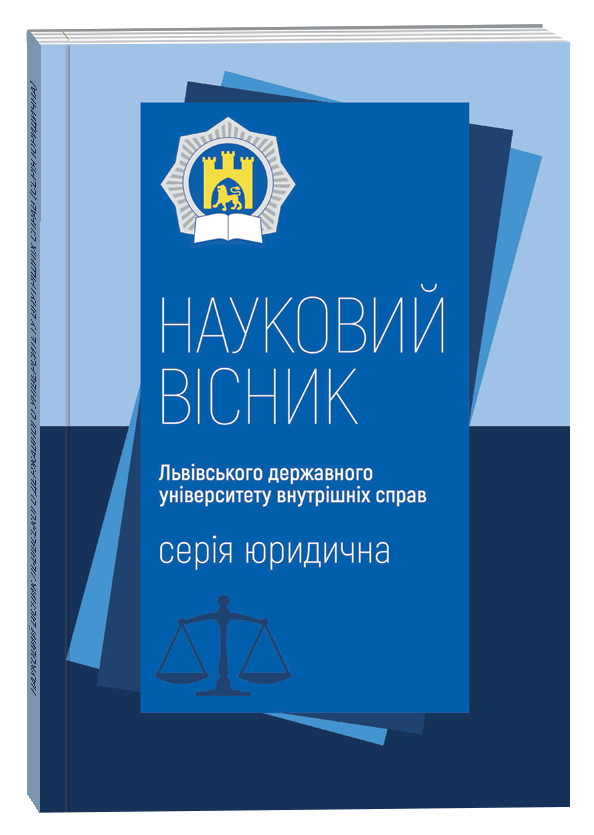EXEMPTION FROM PUNISHMENT DUE TO ILLNESS: CRIMINAL-LEGAL AND CRIMINAL-EXECUTIVE ASPECTS
DOI:
https://doi.org/10.32782/2311-8040/2023-3-3Keywords:
Criminal Code, Criminal Executive Code, criminal liability, penal institution, condemned, disease, relief from penaltiesAbstract
The article characterizes the criminal-legal nature of exemption from punishment due to illness, analyzes the criminal and criminal-executive legislation of Ukraine, which regulates the procedure for exemption from punishment due to illness, pays attention to the state of compliance and ensuring the rights and obligations of citizens who are subject to exemption from punishment due to illness. An important priority of modern criminal law policy is humanizing the responsibility of persons who have committed, as a rule, criminal misdemeanors and minor crimes. The harsh approach to the release from punishment of severely, often incurably and terminally ill convicts is largely due to the influence of the previous and shortcomings of the current legislation. Unfortunately, a similar situation with exemption from punishment due to illness persists to some extent even today. The complex structure of this criminal law norm, the concentration in it of several fundamentally different types of exemption from punishment and its serving complicate its interpretation and application. The purpose of the study is to study and analyze the norm on exemption from punishment due to illness in criminal and criminal executive laws from the point of view of legal technique. Given that criminal offenses are different in terms of the degree of public danger they cause, are committed by different persons, the court applies criminal penalties in order to achieve the goal of correcting the person. But in life, there are cases when the process of correction of a person guilty of a criminal offense is possible without applying a criminal penalty to the person, or in the case of a convicted person, this goal is achieved before the full serving of the punishment established by the court verdict. That is, the application or further application of punishment is inappropriate. It is to solve such situations that the institution of exemption from criminal punishment and its further serving in general and exemption from punishment for illness in particular was developed and legislated.
References
Конституція України. URL: http://zakon.rada.gov.ua/laws/main/254к/96-вр. 2. Кримінальний кодекс України. URL: http://zakon4.rada.gov.ua/laws/show/ 2341-14. 3. Кримінально-виконавчий кодекс України. URL: http://zakon.rada.gov.ua/ laws/show/1129-15.
Кримінальний процесуальний кодекс України. URL: https://zakon.rada.gov.ua/laws/show/4651-17.
Карпачова Н.І. Дотримання прав людини в місцях позбавлення волі. Стан дотримання та захисту прав і свобод людини в Україні : перша щорічна доповідь Уповноваженого Верховної Ради України з прав людини. URL: http://www.ombudsman.kiev.ua.
Денисов С.Ф. Рецидивна злочинність молоді: інтегративна перспектива аналізу. Вчені записки Таврійського національного університету імені В.І. Вернадського. Серія «Юридичні науки». 2010. Т. 23 (62). № 1. С. 274–279.
Грищук В.К. Кримінальне право України: Загальна частина : навчальний посібник для студентів юридичних факультетів вищих навчальних закладів. Київ : ВД «Ін Юре», 2006. 568 с.
Про психіатричну допомогу : Закон України від 22 лютого 2000 р. № 1489–ІІІ. Офіційний вісник України. 2000. № 12. С. 24–41.
Баулін Ю.В. Звільнення від кримінальної відповідальності. Київ : Атіка, 2004. 296 с.
Про практику застосування судами законодавства про звільнення від відбуття покарання засуджених, які захворіли на тяжку хворобу : постанова Пленуму Верховного Суду України від
вересня 1973 р. № 8. Збірник постанов Пленуму Верховного Суду України у кримінальних справах :навчально-практичний посібник / укл. Б.О. Кирись. Львів : Ліга-прес, 2008. С. 81–84.









